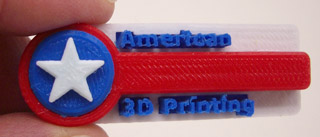






Q: What is 3D Printing? A:
It is a fabrication process where material is added to make an object.
It is the opposite of machining, grinding, sanding, cutting and
drilling where material is removed from a chunk of something to
make an object. Q: How does it work? A:
There are a number of different 3D printing technologies. We use
Fused Deposition Modeling (FDM), also known as Fused Filament Fabrication
(FFF). Plastic filament, which looks like weed trimmer line, is
fed into a nozzle, where it is heated until it is melted, then extruded
out like a tiny hot melt glue gun. The nozzle is moved across a
surface and a tiny line of molten plastic is extruded, like a tiny
line of toothpaste. Many lines are extruded next to each other until
the bottom layer of the object is formed. Then the surface moves
down a tiny bit and the next layer is deposited on top of the first
layer. After hundreds or even many thousands of thin layers have
been precisely applied, the object is complete and can be removed
from the printer. Q: How does the printer know where to put the plastic? A:
A computer file called a 3D model defines the size and shape of
the object. The printer is basically a computer controlled robot
that extrudes the plastic according to the computer model. Q: Where does this computer file come from? A:
You can make a 3D model with 3D CAD software, 3D sculpting software,
you can scan an object to make the 3D model, or you can download
a 3D model that someone else created. Q: Why use 3D printing? A:
It is ideal when you only want one of something or a few of something,
especially something one of a kind or custom. Q: Why not make everything with 3D printing? A:
Right now it is slower and costs more than mass-production methods
like injection molding. Q: Who would want to use 3D printing? A:
Everyone has some need for 3D printing once they understand what
it can do. That’s why we opened this store. It can make some
types of things much more quickly and cheaply than other methods.
For example, an architect can have a model of their design to show
their client with a fraction of the work it would take to make one
the old fashioned way. Engineers and inventors can rapid-prototype
their parts and try many different versions before going into production.
You can make a replacement part for something around the house or
in your car that broke much quicker and easier than waiting to get
one from the manufacturer, if it is even made any more. Hobbyists
can make custom models for their doll houses, railroads, drones
and RC airplanes. And of course the best thing about 3D printing
is endless customization. For example, a bride and groom can get
scanned and be themselves at the top of their wedding cake! Q: What kind of plastic do you use? A:
We dozens of different types of materials. A commonly used type
is called PLA, which stands for Poly Lactic Acid. It is plant-based,
is non-toxic and biodegradable. The PLA we use is specially formulated
for 3D printing, and we have dozens of colors. ABS is the same type
of plastic that Legos are made of, is stong and waterproof. A variation
of this is called ASA and is UV stable for outdoor applications.
We have 9 different kinds of industrial-strength Nylon, including
carbon fiber reinforced, and a special PET (polyethylene terephthalate)
with remarkable optical clarity in both clear and translucent colors.
Another type of PET we use is called PETg. We have HIPS, or High
Impact Polystyrene. We have several types of flexible urethane filament
which makes things that feel like rubber. We have PVA, and Aquatek,
which are water soluable meterials that we use for dissolvable support
structures. We also have a number of specialty materials ranging
from brass, bronze, stainless steel and wood to masonry and glow
in the dark. For extreme strength and rigitity we have carbon fiber
reinforced nylon, PETg and HTPLA. We are excited build with these
materials, which are all specially formulated for 3D printing. Q: I have an idea for an invention but don't have time to learn all that 3D software. Can you help? A:
Of course! We have designers with decades of product development
experience on staff, and have completed the required coursework
to be certified in Solidworks. Q: How much does it cost? A: Our prices for services and equipment are on the front page of this web site, and the prices for our materials are in the gallery section where you can see all the colors you can choose from. Unlike some of our competitors, we do NOT charge a setup fee, and when you buy equipment from us, the training and support is included. Q: What if I don't like how it came out? A: We have a 100% satisfaction guarantee on our work. If you don't like it, you don't have to pay for it, whether it is a build, a scan or design. You don't get to keep it of course, but you are never stuck with something you aren't completely delighted with. Equipment carries the manufacturer's warrantee. Q: Can you make something with more than one color at a time? A: YES! Our Lulzbot TAZ Pro has a dual extruder. In addition,we can make something that contains more than one part in different colors, like our logo. The logo was made from 5 separate parts glued together.
Q: Can I paint these plastic objects? A: You most certainly can! |




 FAQ
FAQ